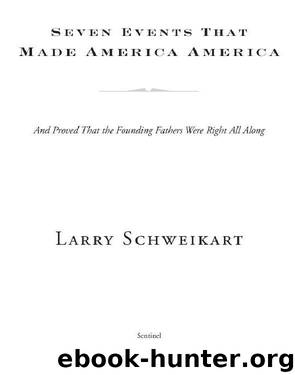Seven Events That Made America America by Larry Schweikart

Author:Larry Schweikart
Language: eng
Format: epub
Publisher: Penguin USA, Inc.
Published: 2010-05-05T16:00:00+00:00
6.
RONALD REAGAN TRIES TO KEEP THE PEACE . . . AND MAKES HIS BIGGEST MISTAKE
It is not a field of a few acres of ground, but a cause, that we are defending, and whether we defeat the enemy in one battle, or by degrees, the consequences will be the same.
THOMAS PAINE, THE CRISIS, 1777
Even if Ronald Reagan had done nothing but end the Cold War, his place in history still would have been assured. But by simultaneously rescuing the American economy from a decades-long death spiral, and by touching off a boom that spawned 14 million new jobs and almost twenty-five years of prosperity, Reagan ensured his place next to Washington, Lincoln, and the Roosevelts as one of the most influential presidents in America’s history. His sunny optimism, unrelenting faith in America’s virtues and foundations, and relentless determination to make the American dream a reality for the citizens has elevated him to the highest echelons of our leaders. By liberating millions, Reagan’s place in the world aligns him with the greatest champions of human freedom who ever lived.
Yet Reagan had shortcomings. His own admitted failing was that he was unable to change the culture in Washington, D.C., in such a way as to reduce the size of government. For that, while he may have been naive—no administration, including some of the earliest small-government advocates such as Thomas Jefferson, had successfully controlled the growth of government for long—he nevertheless fell in line with virtually every one of his predecessors, liberal or conservative. Martin Van Buren, Grover Cleveland, and Calvin Coolidge, all of them dedicated to containing the size of the federal government, all watched per capita spending increase during their tenure. The Gipper fully understood the threat posed by an ever-growing federal bureaucracy, in terms of both weights placed on the nation’s enterprise and, more important, infringements of the freedoms of its people.
If Reagan’s greatest and most timeless triumph was in foreign policy, so was his greatest error, and, in the latter case, it was a two-fold error. First, he deployed the U.S. Marines in Lebanon as part of a “peacekeeping” mission that not only lacked an attainable goal, but also did not employ rules of engagement sufficient to allow the Marines to protect themselves. Such missions, unfortunately, were common during the Cold War in both Republican and Democratic administrations. After a suicide bomber attacked the Marine barracks in Lebanon, however, Reagan—after attempting to stay the course—finally withdrew the forces. By doing so, he indeed took the prudent military action, and, most likely, made the wisest political choice. Had the marines stayed, there is little evidence that they could have made much of a difference. Unfortunately, the withdrawal of the U.S. forces constituted a second edge of that troubled blade, for it displayed a lack of appreciation for the longer-term threat: the growing danger posed by the rise of Islamic fundamentalism.
Certainly Ronald Reagan knew radical Islam existed. In An American Life, he wrote:I don’t think you can overstate the importance that
Download
This site does not store any files on its server. We only index and link to content provided by other sites. Please contact the content providers to delete copyright contents if any and email us, we'll remove relevant links or contents immediately.
| Canada | Caribbean & West Indies |
| Central America | Greenland |
| Mexico | Native American |
| South America | United States |
Cat's cradle by Kurt Vonnegut(13911)
Pimp by Iceberg Slim(12959)
Underground: A Human History of the Worlds Beneath Our Feet by Will Hunt(11279)
4 3 2 1: A Novel by Paul Auster(11087)
The Radium Girls by Kate Moore(10933)
American History Stories, Volume III (Yesterday's Classics) by Pratt Mara L(4830)
Perfect Rhythm by Jae(4634)
Wiseguy by Nicholas Pileggi(4616)
The Fire Next Time by James Baldwin(4358)
Paper Towns by Green John(4183)
A Higher Loyalty: Truth, Lies, and Leadership by James Comey(4047)
Pale Blue Dot by Carl Sagan(4027)
The Mayflower and the Pilgrims' New World by Nathaniel Philbrick(3922)
The Doomsday Machine by Daniel Ellsberg(3744)
Too Much and Not the Mood by Durga Chew-Bose(3705)
Killers of the Flower Moon: The Osage Murders and the Birth of the FBI by David Grann(3634)
The Borden Murders by Sarah Miller(3598)
The Sympathizer by Viet Thanh Nguyen(3534)
Killing England by Bill O'Reilly(3470)
